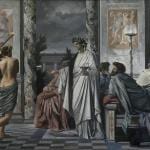 I would be hard at work on some important email or working on the media system (so fearfully complex that the children called it The System) and one of them would come and interrupt.
I would be hard at work on some important email or working on the media system (so fearfully complex that the children called it The System) and one of them would come and interrupt.
Oh, blessed days!
I knew just enough then to know that the day would come when I would miss those interruptions. Now, decades later, I would wish that this piece or anything else I am doing would be interrupted by, “Dad . . . ”
Work had to be done. There was nothing wrong, I guess, with fixing things so we could stream movies (long before streaming was a thing). Yet as I knew then would be true, not one minute I ignored the people in my house seems worthwhile now and not one moment I spent with them seems wasted. We took a few trips before they got too busy, when they could still go, and we could not (quite) afford those trips. I am not sorry.
The interruptions of our children were not interruptions, but life. “Beware,” I think, “even now confusing the meaningful moments of life for interruptions.”
How can we know the difference?
When our routine is disturbed, this might be a distraction from our key work, like the men who tried to get Nehemiah from rebuilding the walls of Jerusalem. This bad distraction, the true interruption, prevents us from doing what we should. We should work through this kind of interruption the best we can. Our enemies (the world, our own flesh, and evils) mean to keep us from what brings flourishing.
Sometimes, however, we confuse (or at least I confuse) some auxiliary task for the main job of being a whole soul ready for Paradise. We are grinding away at some job and our real life “interrupts.” This interruption is not, but an unexpected opportunity. When the dwarves turn up at Bilbo’s front door in The Hobbit, this was not an interruption in Bilbo’s life, but the beginning of his real life.
When our children come to us to learn, then we are most often doing our key work when we stop and talk with them.* When building The System, this was for the family to enjoy. One cannot (generally) ignore family time in order to have family time. The System must be built for the family, not the family for The System. In the world of home electronics and computers, I did not always remember this truth.
What am I doing? Why am I doing this thing? In education, learning is never a disruption. The student, if acting as a true student, is the class, not a disruption to the class.
I thought of this, because of three interruptions in the masterwork on education The Republic. At the start of Books II, IV, and V, young men interrupt Socrates. One might think this is bad, Socrates is one of the greatest teachers who ever lived after all. Yet a main reason he is so marvelous as a teacher is that Socrates never views a sincere interruption as a distraction. He knows that the discussion is for the students, not the students for the discussion. In Book II the students interrupt and save the discussion from ending. In Book IV a student is unsure that the thought experiment is really doing justice. Even more shockingly, Socrates’ students refuse to follow his lead at the start of Book V and so there is a great distraction. . .
This interlude lasts until Book VIII, but the intermediate books contain some of Plato’s greatest imagery and ideas. The City in Words gains a philosopher king. Plato’s theory of knowledge gains the “divided line” and Book VII begins with the cave analogy. The distraction produces brilliance when the teacher followed the students and risked their misunderstandings, confusions, and questions.
The interruptions become key to the dialogue. Every teacher who follows Socrates in teaching knows this truth. The lesson plan proposes, the student disposes!
So it goes in parenting, education, business. The main thing, almost always a human or Divine thing, must remain the main thing.
Come life. Come wisdom. Come children, now adult, and interrupt me. Come Holy Spirit and interrupt us all.
—————————-
*Obviously there are other important tasks that we must do and children can prevent those tasks. . .but there are far fewer of those than many of us think.












